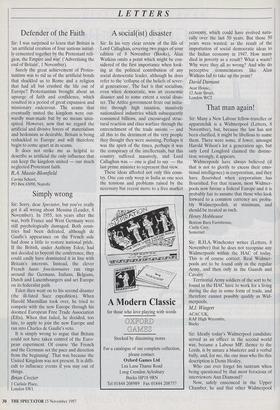Simply wrong
Sir: Sorry, dear Spectator, but you've really got it all wrong about Messina (Leader, 8 November). In 1955, ten years after the war, both France and West Germany were still psychologically damaged. Both coun- tries had been defeated, although de Gaulle's appearance on the French side had done a little to restore national pride. If the British, under Anthony Eden, had not decided to boycott the conference, they could easily have dominated it in line with Britain's interests. Instead, the clever French hauts fonctionnaires ran rings around the Germans, Italians, Belgians, Dutch and Luxembourgers and set Europe on its federalist path.
Eden then went on to his second disaster (the ill-fated Suez expedition). When Harold Macmillan took over, he tried to compete with the new Europe through his doomed European Free Trade Association (Efta). When that failed, he decided, too late, to apply to join the new Europe and ran into Charles de Gaulle's veto.
It is simply wrong to argue that Britain could not have taken control of the Euro- pean experiment. Of course 'the French and the Germans set the pace and direction from the beginning'. That was because the United Kingdom was not present. It is diffi- cult to influence events if you stay out of things.
Brian Crozier I Carlisle Place, London SW1










































































 Previous page
Previous page